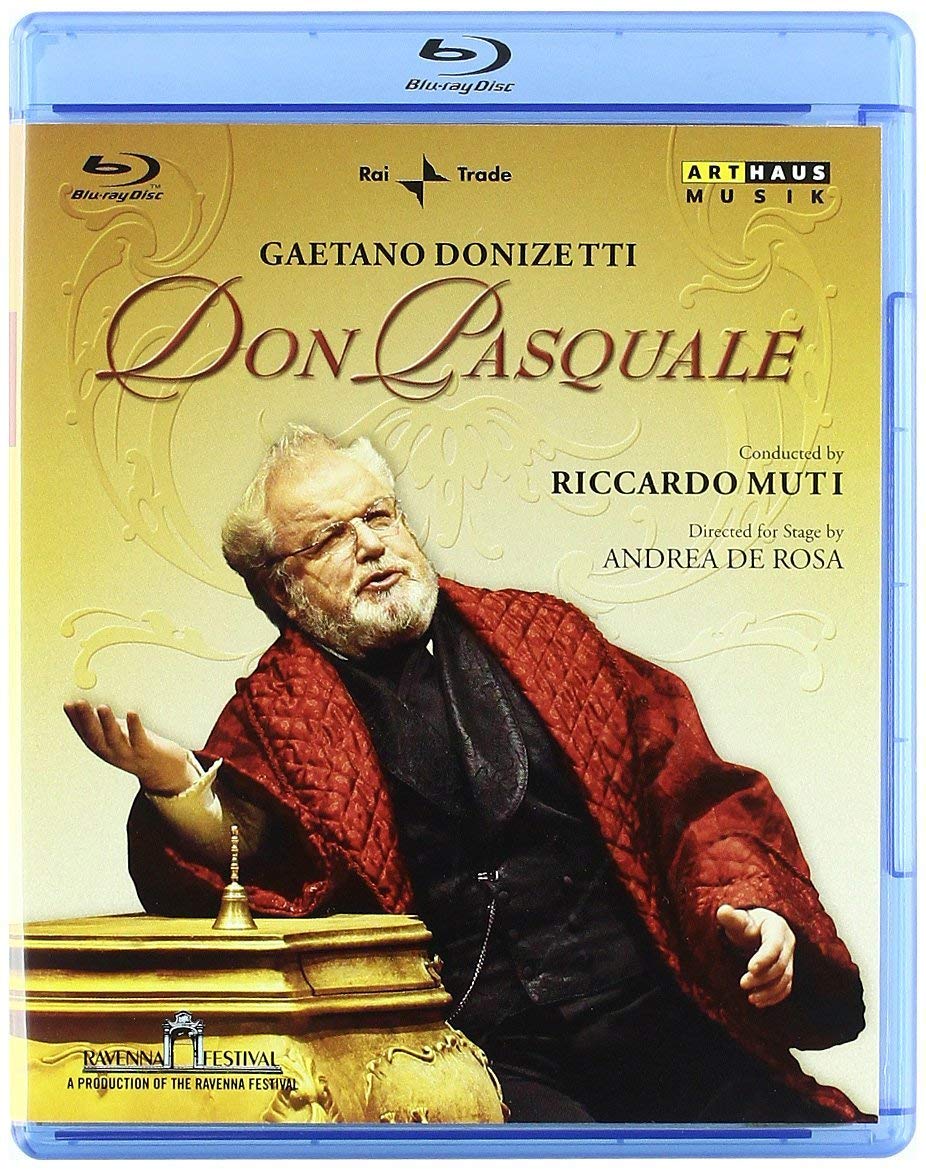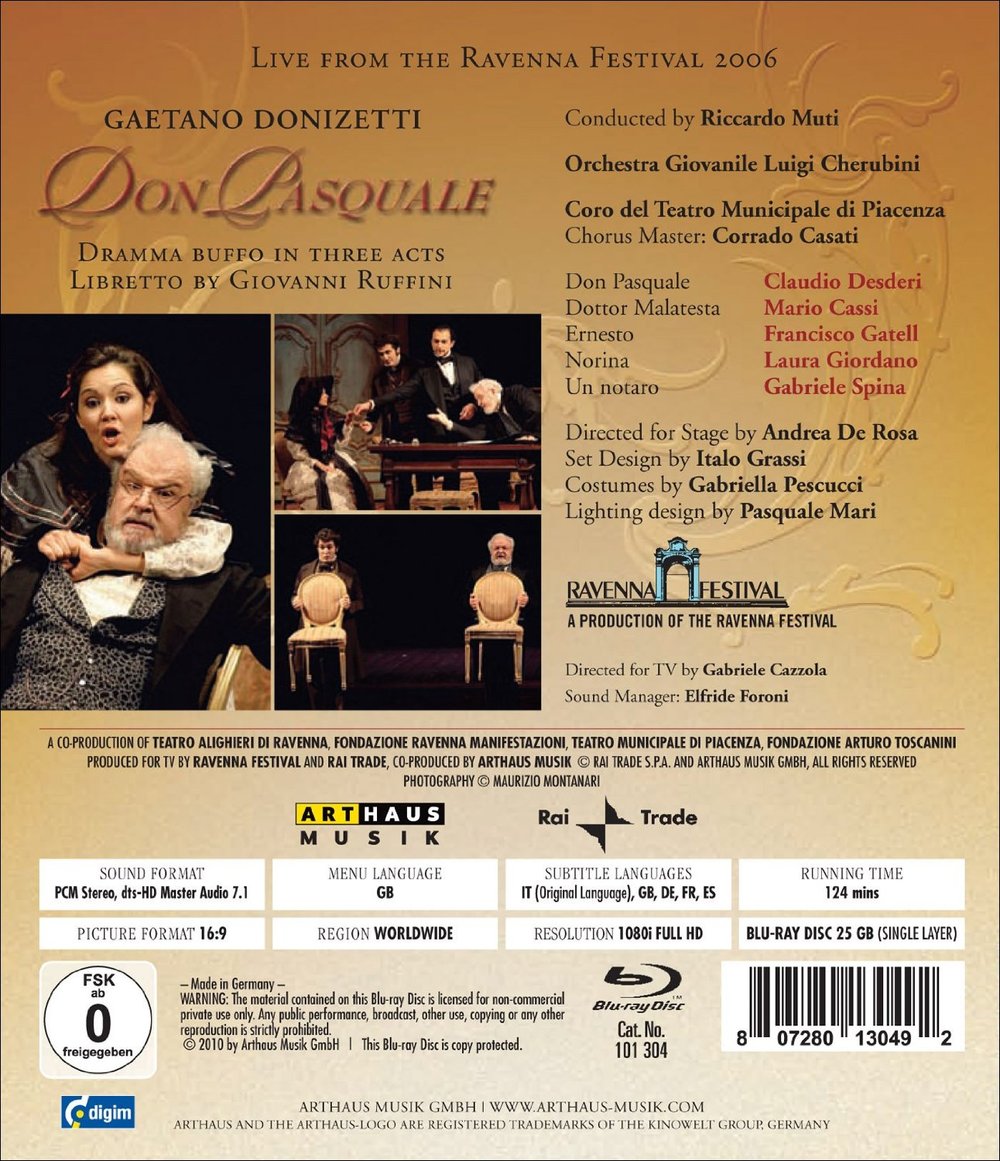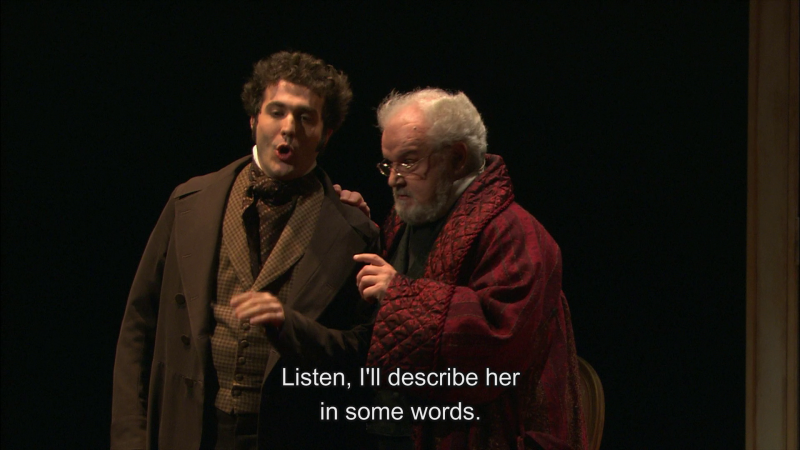

Donizetti Don Pasquale opera to libretto by Giovanni Ruffini. Directed 2006 by Andrea de Rosa at the Ravenna Festival. Stars Claudio Desderi (Don Pasquale), Laura Giordano (Norina), Mario Cassi (Malatesta) Francisco Gatell (Ernesto), and Gabriele Spina (Notary). Riccardo Muti conducts the Orchestra Giovanile Luigi Cherubini and the Chorus of the Teatro Municipale di Piacenza (Chorus Master Corrado Cassati). Set design by Italo Grassi; costumes by Gabriela Pescucci; lighting by Pasquale Mari; music advice from Nicola Colombini and Dino Doni; sound recording managed by Elfride Foroni. Directed for TV by Gabriele Cazzola. Sung in Italian. Released 2010, disc has 7.1 dts-HD Master Audio sound. Grade: A+
Forget broth; it's time for froth. It's time for another bel canto comedy where the imbecility of the plot is cheerfully swallowed whole because everybody is having so much fun. Let's plunge right into screenshots.
Don Pasquale (Claudio Desderi) is 75 or so. A life-long bachelor, his only heir is his nephew, Ernesto:
Nephew Ernesto (Francisco Gatell) lives with Pasquale, and they have had a quarrel. Pasquale arranged a marriage for Ernesto with a wealthy (and probably homely) girl. But Ernesto turned Pasquale down because he loves a beautiful, worthy, poor girl named Norina:
Norina (Laura Giordano):
Since his closest relative rejects his advice, Pasquale decides to get married himself and try for a more cooperative heir. But where do you look, at age 75, for a fertile young bride? Pasquale consults his Doctor, Malatesta (Mario Cassi), who is also a friend of Ernesto. Malatesta comes up with a scheme of the sort than can exist only in bel canto comedies. He will arrange for a phony marriage for Pasquale and then trick Pasquale into allowing Ernesto to marry Norina. (The preceeding sentence may not make sense to you until the last few minutes of the opera.) Here Malatesa tells Pasquale that he has found a bride for him:
Malatesta has a sister, Sofronia, who is in a convent. Malatesta falsely says the sister wishes to leave the convent to marry:
Pasquale daydreams of being a 25-year old daddy:
Pasquale tells nephew Ernesto to move out:
Ernesto is devastated. There follows the saddest trumpet solo in the history of music as Ernesto packs to start his own Winterreise. Ernesto gets the only aria in this romp---by the time he's through, you fear he will spoil the show by committing suicide:
At the same time, Malatesta recruits Norina to play the role of Sofronia the bride. Only in their haste, they don't have time to tell Ernesto about their scheme. Malatesta and Sofronia visit Pasquale, and here Sofronia lifts her veil for the first time for a man to see her:
Pasquale is smitten like a gnarled, mossy tree just split by lightening. He begs for the notary to officiate the marriage immediately. Pasquale asks Ernesto to be a witness. Malatesta's scheme almost falls apart when Ernesto is astonished to see that Norina is to be Pasquale's bride!
A done deal:
Pasquale finds out fast how much things can change after a wedding:
The new Lady Pasquale immediately embarks on an orgy of spending. Pasquale goes to bed early, but his lady is going out:
There's a fight and Norina slaps the Don so hard he falls down:
Norina knows she went too fall by hitting her "husband":
The next night the young lovers meet in Pasquale's garden. They tip off Pasquale as part of the scheme. But first there's time for a love duet:
Pasquale tries to catch his "wife" cheating, but her lover has slipped away. Pasquale orders Sofronia to leave his house, but she refuses. Then Malatesta suggests that Ernesto should marry Norina so there can be two couples living in the Pasquale house. To that, Sofronia tartly replies:
With that, Pasquale sees a way to get rid of Sofronia. He gives his consent for Ernesto to marry Norina. Imagine his confusion when he finds out that Sofronia and Norina are the same beautiful girl! No problem. This is bel canto, and Don Pasquale has learned his lessen:
At least some of this film must have been made on the opening night. Everybody piles onto the stage in a raucous curtain call to waves of cheering. I would surmise that many of the near and close-up shots were made later and blended in:
This title shows you can get a hit from a minor festival even if the production is mounted with a small orchestra, a tiny black-background stage, and almost no scenery. Start with a few elegant props and costumes. Then you need a secret weapon. Here that's Laura Giordano as Norina. Giordano is astonishingly beautiful, really does look like a 19-year-old virgin, can act, and sounds about as good to me as any of the famous sopranos. Her work alone almost nails down at least an "A" grade for this disc. (She was also smashing as Musetta in the Teatro Real La Bohème published by Opus Arte on HDVD in 2008.)
All the other signers are also beautiful to look at and hear, and they all can act. The best known of the male singers would be Claudio Desderi, who has long been a favorite in Italy in buffo roles. And when Francisco Gatell sings solo, the girls in your audience will all but faint.
The most famous name here by far is Riccardo Muti, who is on many lists of the greHere’s a trailer in SD. atest symphony conductors working now. My reading of the keepcase booklet suggests that this production was a pet project of the Muti family. The orchestra musicians were told, I'm sure, that they would be featured in a video of the show. You can see and feel their excitement as they get their chance to show you and the famous conductor what they can do. I don't have a screenshot of the chorus. But they do have a memorable role acting as servants and trades persons when Sofronia goes on her spending spree.
Everything about this disc is attractive. No fake applause. This really was recorded live before an enthusiastic sold-out house; the crowd adds excitement by warmly applauding frequently. Cazzola is maybe the most experienced videographer in Italy, and he made a superb video of the whole production including the orchestra. Elfride Foroni did a excellent job of recording the singers and the orchestra. I was especially impressed by his clear, warm, double-bass sound which is so effective in the love duets. (Too often the double-basses in our opera discs are so poorly recorded that their pizzicato notes sound like something from a bass drum.) The balance between the singers and the orchestra is always good. Every name in the very nice keepcase booklet is Italian or Latin. So now I get it: what we have here is the big, blatant, beating heart of mafia opera.
Finally, I shouldn't forget that this disc has nice subtitles, including the sung language Italian. Because all the singers grew up in Italy, the Italian diction is perfectly clear. With the Italian subtitles I can understand every syllable even if I don't know the meaning of most of the words. If you want to improve your Italian, this would be a wonderful resource. Grade: A+.



















